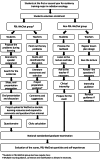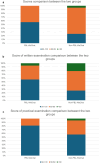Problem-based learning on the WeChat public platform in radiation oncology residency training programs
- PMID: 39538173
- PMCID: PMC11562837
- DOI: 10.1186/s12909-024-06311-3
Problem-based learning on the WeChat public platform in radiation oncology residency training programs
Abstract
Purpose: This study explored the effectiveness of a Problem-based Learning (PBL) teaching model on the WeChat public platform for radiation oncology residency training programs.
Materials and methods: The WeChat PBL program was initiated in 2019. The study recruited student participants, on a voluntary basis, who were in their first and second years of standardized training in radiation oncology. We selected classic and trending issues in radiation oncology as the two main teaching topics. Students in the PBL group searched for relevant literature, summarizing PowerPoint presentations or academic speeches on specific issues published on the professional WeChat public platform after an in-depth review by teachers. The final national standardized training examination scores for resident physicians were used to evaluate teaching effectiveness. The graduation scores of the PBL and non-PBL groups were compared, and a stratified analysis was conducted based on the year of participation to assess the teaching effectiveness of this model. Moreover, questionnaires were administered to evaluate students' experiences.
Results: Among the 36 students who joined the study in 2019, 16 (44.0%) voluntarily joined the PBL teaching group. Nine students started teaching PBL in their first year of residency, accounting for 47.4% of that year, and seven started in their second year, accounting for 41.2%. The average graduation scores of the PBL group were superior to those of the non-PBL-focused group for the same grade. The rate of high scores among students in the PBL group (56.3%) was higher than that of students in the non-PBL group (25%). Specifically, first-year residents who joined the PBL group had an average score of 92.3 ± 2.2, significantly higher than their non-PBL counterparts, who scored an average of 88.6 ± 4.6, showing a statistically significant advantage (p = 0.042). All students were satisfied with the PBL WeChat teaching and would recommend the PBL WeChat course to others.
Conclusion: The PBL residency teaching model on the WeChat platform improved residency scores and garnered student satisfaction.
Keywords: Medical education; Problem-based learning; Radiation oncology; WeChat platform.
© 2024. The Author(s).
Conflict of interest statement
Figures
References
-
- Tyldesley S, Delaney G, Foroudi F, Barbera L, Kerba M, Mackillop W. Estimating the need for radiotherapy for patients with prostate, breast, and lung cancers: verification of model estimates of need with radiotherapy utilization data from British Columbia. Int J Radiat Oncol Biol Phys. 2011;79(5):1507–15. - PubMed
-
- Huang L, Cai Q, Cheng L, Kosik R, Mandell G, Wang SJ, Xu GT, Fan AP. Analysis of curricular reform practices at Chinese medical schools. Teach Learn Med. 2014;26(4):412–9. - PubMed
-
- Li H, Zhou X. Medical education reform in China. Postgrad Med J. 2018;94(1118):673–4. - PubMed
MeSH terms
Grants and funding
LinkOut - more resources
Full Text Sources



